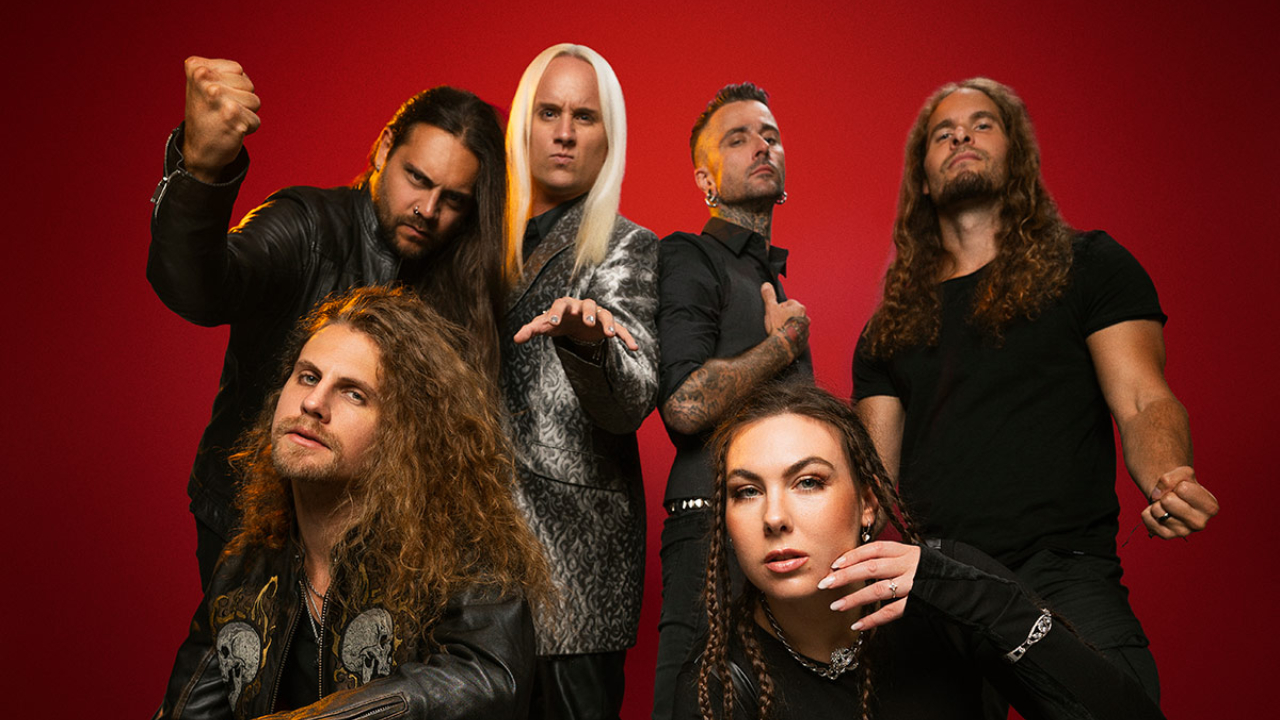“We knew if we stuck together, we would create great things.” Amaranthe have three vocalists and make music that resembles ABBA on a bloodthirsty rampage. They might just be the most extra band in heavy metal
Swedish metallers Amaranthe open up on a career - and a sound - like no other

Amaranthe’s Elize Ryd and Olof Mörck can clearly remember the night they met. It was 2005 during an evening at Gothenburg’s now-defunct Diamond Dogs rock bar. At the time, Elize was an aspiring singer who had sung on a track by local band Falconer, catching the attention of Olof, who was making a name for himself as the guitarist in power metal band Dragonland. That night, they talked about the bands they loved for hours, discussed the universe and watched the stars. By the end of the night, they’d struck up what Elize describes today as a “spiritual” connection.
“We just knew, if we stuck together, we would create great things.” That’s exactly what they did. Since releasing their self-titled debut in 2011, Amaranthe have become one of the hardest-working bands in metal, releasing six albums and touring incessantly. And in that time, they’ve established themselves as one of power metal’s most OTT operators, with three bombastic vocalists backed by an undeniably divisive blend of death metal, power metal, pop and electronica, resembling ABBA on a bloodthirsty rampage.
The band’s seventh album, The Catalyst, might be their most audacious yet. While the band have often, lazily, been lumped in with symphonic metal – no doubt due to the presence of a female singer – for the first time, this record sees them lean into that genre’s splashy inclinations. It’s also their most conceptual release, delving into themes of transformation. Veering from the abstract to the unflinchingly literal, the 12 tracks breathlessly explore everything from climate change to Artificial Intelligence to vampire transformation (see grandiose single Damnation Flame and its bloodthirsty video). On paper, it reads like the band chucked ‘change’ into a word cloud. On record, it’s a fizzy, bombastic riot.
“Maybe it’s our most dynamic and brave record,” chuckles Elize over Zoom. “But it was also fun. We always made jokes that Olof is a vampire because he’s never aged.” Born in Sweden, pop music is in Elize’s bones. Outside Amaranthe, she co-writes songs for Finnish pop band Cyan Kicks, while any song on The Catalyst could easily own the stage at Eurovision – in particular, Outer Dimensions riffs off the vocal melody of ABBA’s S.O.S. While Olof handles Amaranthe’s arrangements and lead guitars, and they write the lyrics together, she is in charge of the ‘toplines’, the hooks and melodies that define the band’s gleaming sound.
“There was nothing else like Amaranthe,” she insists of the moment they emerged, sticking out like a sore thumb, in the late 2000s. “And today, I’m not sure actually if there is.” Elize was introduced to metal by her older brother and long-time Metallica fan, Johan Carlzon, a “local celebrity” due to his renowned growls as vocalist in local doom band Abandon. It was Johan who encouraged Elize to pursue a career in metal, although he never got the chance to hear her sing as part of Amaranthe: he passed away at the age of 32, following an overdose. At that time, Olof was struggling with his own grief, having lost his father. Looking back, Elize sees how their mutual pain brought them together as friends and artists.
“It helped to write more of the uplifting stuff, to push ourselves,” she explains. Writing songs, she says, was a way for her and Olof to heal, as well as keeping her brother’s memory alive. To this day, they’ve never had an argument. “We’ve always found comfort and peace with each other. That’s why it can’t be broken or taken away, because it’s an organic thing. It comes from a very real place."
Holed up during the pandemic in 2020 and unable to tour, the duo started throwing around concepts for what would eventually become The Catalyst, landing on issues that had been niggling on Elize’s mind, including the lasting effects of Covid on society, the looming shadow of worsening climate change and the impact of the rise of AI on creative industries. While the recording of the album was way underway by the time Russia invaded Ukraine in February 2022, the ensuing war has only compounded her sense of helplessness in the face of a world shifting on its axis.
Sign up below to get the latest from Metal Hammer, plus exclusive special offers, direct to your inbox!
“The album is not so much focused on the political, but more about the emotional aspect,” she says. “Even though the world is changing, how can you try to cope with it?” Watching the Ukraine war from afar has taken a toll: “I actually know people from Ukraine personally, so everything feels, for me, very close.” Yet that same attitude that first bonded her and Olof shines through in the music: “Love always wins over hate.”
From the beginning, Olof Mörck wanted Amaranthe to “provoke”. “When it comes to metal, fans are enormously conservative,” he says, when we speak to him on a separate Zoom call just before Christmas. Having wrapped up band business for the year, he chats to us from his Gothenburg home while gingerbread bakes in his kitchen. He remembers it being harder to cross boundaries during the band’s early days. “In 2008, it was infrequent for bigger metal bands to even have melodic choruses. There was a certain stigma to having really catchy hooks and that’s something that we challenged.”
In 2005, he was working a day job as a kindergarten teacher, but had released three albums with his power metal band, Dragonland. “I had gotten into law school... then we went to Japan with Dragonland and we got to headline this really cool festival and play in front of thousands of screaming Japanese fans,” he says with a chuckle. “It was the last nail in the coffin, like, ‘OK, let’s drop all the back-up plans.’ The trip to Japan was a total catalyst for me, for getting a kick in the right direction.”
Having grown up in Gothenburg during the city’s mid-90s melodeath boom, he had joined power metallers Dragonland in 1999, a band he’s still a studio member of now, although Amaranthe keeps him too busy to tour. But by the time he met Elize, he had envisioned a new band, one that blended pop gloss with power and death metal riffs, and had begun to flesh out ideas. He’s keen to stress, though, that Amaranthe are not “his” band.
“It was really only when I started to write music with Elize that the pop elements became good,” he says. “It went from zero to 10 as soon as she was involved in it.” What does the title of The Catalyst mean to him? “I think we are, as a collective species, going through a very transformative era right now in a lot of different ways, and a lot of them are not necessarily that positive,” he explains.
He reaches for AI as an example. "Fifty years ago they were dreaming about a future where robots would do the chores and we’d be free to focus on artistic things, but lately it has proven to be the opposite. You have AI producing art and music while you have a human still doing the same chores that we did 50 years ago.”
Sonically, he describes The Catalyst as the band’s “most eclectic and diverse” album yet – quite a statement in a discography where every album has actively tried to leapfrog the record before it in terms of excess. “There’s some 80s, retro, cyber punk vibes on a couple of songs,” he says. “There are even some almost Gaelic folk music influences here and there. It’s not about limiting yourself, it’s about finding the path forward.”
Last year, Amaranthe played the main stage at Wacken Open Air in Germany, a place tantamount to holy ground as far as Olof is concerned. “That’s been a lifelong dream,” he says. “We played there twice before on significantly smaller stages.” During the lavish track Amaranthine, he was struck by the magnitude of the occasion. “You see 40,000 or 50,000 people waving their hands while you’re in the middle playing this guitar solo...” He smiles, describing the memory as an “ego moment”, but also validation of how far the band have come.
Now their focus is on taking it further. When asked separately what the band have left to achieve, Elize and Olof’s answers are strikingly similar, citing collaborations with live orchestras (The Catalyst’s flirtations with symphonic metal are all via samples), and even, in a full 360 ̊ turn, an acoustic album. “I have so many dreams,” smiles Elize. “Something that we’re going to do now with The Catalyst tour, is more stage props, bigger production, more lights,” enthuses Olof, who cites the epic, battle-themed live show of fellow Swedes Sabaton as an inspiration. “In the future, lasers, more pyrotechnics...”
What they won’t do is change their genre-mashing sound, a product of that finger-up-to-the-purists mentality that has propelled them forward for almost two decades. It’s that attitude, Olof says, that has secured Amaranthe hard-won acceptance in the metal scene.
“We’ve always been outsiders in a way,” he considers. “With us still always trying to challenge conservatism and so on, I think it’s become much more obvious where Amaranthe belong as a band. People now feel more comfortable with listening to us and saying that they’re an Amaranthe fan.”
The Catalyst is out now via Nuclear Blast
Danniii Leivers writes for Classic Rock, Metal Hammer, Prog, The Guardian, NME, Alternative Press, Rock Sound, The Line Of Best Fit and more. She loves the 90s, and is happy where the sea is bluest.

